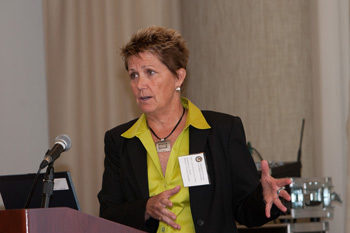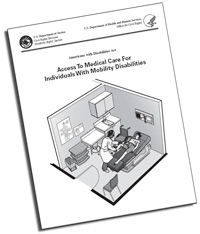.jpg) |
Disability Rights |
On May 24, 2010, the Department filed a Statement of Interest in Williams v. Quinn, a lawsuit alleging that the State of Illinois relies on large institutions to provide long-term care services for individuals with mental illnesses and fails to offer services in community-based settings. (A Statement of Interest is similar to a brief filed as amicus curiae or friend of the court.) The parties had asked the federal court in Chicago to give preliminary approval of a proposed consent decree they had negotiated under which the state will provide community-based services to some individuals, and a group of 17 institutionalized individuals objected, claiming that the proposed decree lacks sufficient detail about how the plan will be implemented and funded, does not provide medical professionals enough authority for determining which residents are appropriate for community placements, and does not adequately explain the proposed attorneys' fees. In its brief, the Department urged the court to give preliminary approval of the consent decree, which the court preliminarily approved on May 27, 2010. As in all class action cases, a "fairness" hearing will now be scheduled to give interested parties an opportunity to comment on the decree. On May 24, 2010, the Department filed a Statement of Interest in Haddad v. Arnold, a lawsuit challenging the State of Florida's requirement that a Medicaid-eligible woman with spinal cord injuries must enter a nursing home for sixty days as a prerequisite to receiving community-based services. The plaintiff in this lawsuit has quadriplegia as a result of a motorcycle accident and has been on the waiting list to receive community-based services since 2007. She resides in her home and was being assisted by her husband with daily living activities such as transferring in and out of bed, eating, and toileting. He continued to assist her for approximately two years after they were divorced. Her 24-year old son then stepped in to assist his mother, but he lives in another city and cannot continue to provide care for her. The Department's brief, filed in the federal court in Jacksonville, argued that the woman is likely to win the lawsuit and should be provided with in-home services while the case is pending. On June 23, 2010, the federal court in Jacksonville issued a preliminary injunction requiring the state to provide in-home services to Ms. Haddad pending a final decision in this case. MULTI-FAMILY HOUSING ACCESS FORUM IN BOSTON DRAWS LARGE TURNOUT
On June 8, 2010, more than 120 developers and building professionals, government officials, and advocates for individuals with disabilities from across New England attended the Department’s eleventh Multi-Family Housing Access Forum in Boston. Hosted by Thomas E. Perez, Assistant Attorney General for the Civil Rights Division, and Steven H. Rosenbaum, Chief of the Civil Rights Division’s Housing and Civil Enforcement Section, the event featured presentations by two design professionals and an accessibility expert, followed by questions from the audience. In his welcoming remarks, Mr. Perez encouraged the building professionals in attendance to comply with the Fair Housing Act’s accessibility requirements at the design and planning stages in their projects, rather than risk enforcement actions and expensive retrofits later. He encouraged compliance with the requirements not only because it is the law and the right thing to do, but because it is the right business choice as well. Mr. Perez noted that, in the coming years, New England will face growing challenges to keep up with the increasing demand for housing and the growing numbers of people with a condition limiting basic physical activities. He emphasized that although the Department has obtained good results through litigation, litigation is costly for all parties. He said the Department would much prefer building professionals to ensure that the housing needs of people with disabilities are met at the outset, eliminating the need for costly retrofits and litigation. The featured presenters were Deborah A. Ryan of Deborah A. Ryan and Associates; Robert Chandler, AIA, of the architectural firm Goody Clancy, and Diane Georgopolus, AIA, of MassHousing and chair of the Boston Society of Architects. Ms. Ryan spoke about the accessibility requirements of the Fair Housing Act and how professionals can ensure compliance by using the Act’s ten “safe harbors.” She also discussed critical differences between federal and state housing accessibility laws and provided guidance to design professionals on how to comply with both. Mr. Chandler spoke about overcoming the challenges of designing accessible housing in densely-populated, older urban settings. Ms. Georgopolus discussed her agency’s efforts to reconcile the Massachusetts Accessibility Code with federal law and provide greater guidance and clarity for design professionals. Launched in 2005, the Access Forum’s objective is to help building professionals understand their legal obligations under the federal Fair Housing Act’s accessibility requirements and to celebrate partnerships that have successfully produced accessible multi-family housing in which everyone profits—developers and consumers alike. The theme of the events is “Good Access is Good Business.” Previous events were held in Philadelphia, Houston, Seattle, Miami, Minneapolis, Phoenix, Atlanta, Dallas, Washington, DC, and Kansas City, Missouri. HOUSING COMPLEXES IN MINNESOTA AND NEW YORK WILL CORRECT DISCRIMINATORY SERVICE ANIMAL POLICIES On May 20, 2010, the federal court in Minneapolis approved a consent decree in United States & Fair Housing of the Dakotas v. Van Raden Properties, Inc., a lawsuit alleging that the owner and management company of a 24-unit apartment building in Moorhead, Minnesota, violated the Fair Housing Act by prohibiting service animals of certain sizes and breeds. The consent decree requires the defendants to revise their policy to remove the size and breed limitations, attend regular fair housing training, and pay $3,000 to Fair Housing of the Dakotas. The lawsuit arose as a result of a complaint filed by Fair Housing of the Dakotas with the U.S. Department of Housing and Urban Development (HUD). HUD issued a charge of discrimination after investigating the complaint, and one of the respondents elected to have the case heard in federal court. On June 8, 2010, the federal court in Brooklyn approved a consent decree in United States v. Sunrise Villas, LLC, a lawsuit alleging that the general manager and assistant general manager of a complex for persons aged 55 and over in Lindenhurst, New York, violated the Fair Housing Act by telling fair housing testers sent by Long Island Housing Services that service animals were not permitted to live at the property. The consent decree requires the defendants to adopt a written assistance animal policy, display a fair housing poster, attend fair housing training, pay $12,186 in damages to Long Island Housing Services, and pay a $1,000 civil penalty to the government. The lawsuit arose as a result of a complaint filed by Long Island Housing Services with HUD. (See previous article in issue # 33.) INDIANA CITY WILL GRANT PERMIT FOR A GROUP HOME FOR RECOVERING ADDICTS On June 15, 2010, the city of Columbus, Indiana, and the Department reached agreement on a consent decree to resolve the Department’s lawsuit alleging that the city’s Board of Zoning Appeals violated the Fair Housing Act when it denied a request from Addictions Counseling Treatment Service, Inc., (ACTS) for a land use variance to operate a group home for up to eleven people recovering from drug or alcohol addiction. ACTS filed a complaint with HUD, which referred the matter to the Justice Department. (See previous article in issue # 33.) The federal court in Indianapolis approved the decree on June 17, 2010. Under the settlement, the city will grant ACTS permission to operate the home if it submits a new application within three years; adopt and implement a policy to address reasonable accommodation requests on behalf of people with disabilities; obtain Fair Housing Act training for the staff of the city’s Planning Department and Board of Zoning Appeals; pay $18,000 to ACTS; and pay $6,000 to the United States as a civil penalty. “Experience has shown that people recovering from addictions to alcohol and drugs can benefit when given the opportunity to live in supportive residences. The Fair Housing Act prohibits local governments from using zoning codes to deny them this opportunity,” said Assistant Attorney General Thomas E. Perez. “The Justice Department will continue to vigorously protect the civil rights of all persons with disabilities across the country.” “Enforcement of the Fair Housing Act in this manner protects the civil rights of persons with disabilities,” said Timothy M. Morrison, U.S. Attorney for the Southern District of Indiana. “These actions encourage local governmental units to end discriminatory policies.” “Recovery programs help the individual and the community. This settlement enables all parties to move forward based on fact, not stereotype,” stated HUD Assistant Secretary for Fair Housing John Trasviña. Did you know... The Department’s housing discrimination complaints and settlements are available at: www.justice.gov/crt/housing/fairhousing/caselist.htm NEW ADA GUIDANCE FOR HEALTH CARE PROVIDERS
NEW PROJECT CIVIC ACCESS SETTLEMENTS Project Civic Access (PCA) is the Department’s wide-ranging initiative to work cooperatively with local governments to ensure that their programs and activities comply with the ADA, allowing people with disabilities to participate more fully in the civic life of their communities. More than 175 agreements have been reached with communities small and large throughout the United States under this initiative. PCA reviews have been conducted in all 50 States, as well as Puerto Rico and the District of Columbia, helping to improve the lives and broaden opportunities for more than 3 million Americans with disabilities. (See previous articles in issues # 3, 5, 9, 17, 18, 28, and 32.) Between October 28, 2009, and June 9, 2010, eleven local governments entered into settlement agreements with the Department under the PCA initiative. The new agreements are with:
The ADA Mediation Program is a Department-sponsored initiative intended to resolve ADA complaints in an efficient, voluntary manner. Mediation cases are initiated upon referral by the Department when both the complainant and the respondent agree to participate. The program uses professional mediators who are trained in the legal requirements of the ADA and has proven effective in resolving complaints at less cost and in less time than traditional investigations or litigation. Over 78% of all complaints mediated have been resolved successfully. Summer is a good time for fun! In this issue, we highlight complaints involving places people go for entertainment that have been successfully mediated. |
||||
|
August 11, 2010

